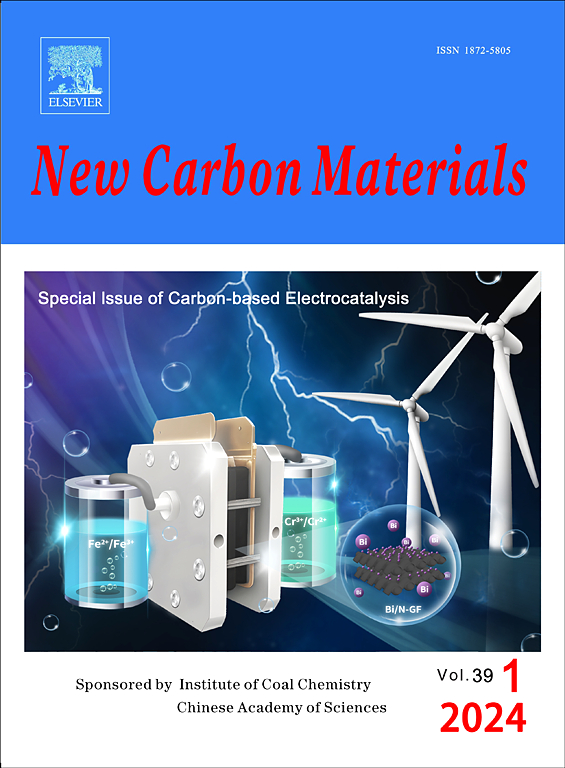碳基锌离子电容器的研究进展
IF 5.7
3区 材料科学
Q2 Materials Science
引用次数: 0
摘要
锌离子电容器(ZIC)由电容器型电极和电池型电极组成,不仅具有超级电容器的高功率密度和电池的高能量密度,还具有资源丰富、安全性高和环保等优点。然而,它们仍然面临着比电容不足、循环寿命短、工作电压和温度范围窄等问题,阻碍了它们的实际应用。我们全面概述了碳基 ZIC 的基础理论,并从碳阴极、电解质和锌阳极三个角度总结了近期的研究进展。我们探讨了碳材料的结构和表面化学性质对 ZIC 电容性能的影响,并为推动其开发和实际应用提供了理论指导。本文章由计算机程序翻译,如有差异,请以英文原文为准。
Research progress on carbon-based zinc-ion capacitors
Zinc-ion capacitors (ZICs), which consist of a capacitor-type electrode and a battery-type electrode, not only possess the high power density of supercapacitors and the high energy density of batteries, but also have other advantages such as abundant resources, high safety and environmental friendliness. However, they still face problems such as insufficient specific capacitance, a short cycling life, and narrow operating voltage and temperature ranges, which are hindering their practical use. We provide a comprehensive overview of the fundamental theory of carbon-based ZICs and summarize recent research progress from three perspectives: the carbon cathode, electrolyte and zinc anode. The influence of the structure and surface chemical properties of the carbon materials on the capacitive performance of ZICs is considered together with theoretical guidance for advancing their development and practical use.
求助全文
通过发布文献求助,成功后即可免费获取论文全文。
去求助
来源期刊

New Carbon Materials
MATERIALS SCIENCE, MULTIDISCIPLINARY-
CiteScore
6.10
自引率
8.80%
发文量
3245
审稿时长
5.5 months
期刊介绍:
New Carbon Materials is a scholarly journal that publishes original research papers focusing on the physics, chemistry, and technology of organic substances that serve as precursors for creating carbonaceous solids with aromatic or tetrahedral bonding. The scope of materials covered by the journal extends from diamond and graphite to a variety of forms including chars, semicokes, mesophase substances, carbons, carbon fibers, carbynes, fullerenes, and carbon nanotubes. The journal's objective is to showcase the latest research findings and advancements in the areas of formation, structure, properties, behaviors, and technological applications of carbon materials. Additionally, the journal includes papers on the secondary production of new carbon and composite materials, such as carbon-carbon composites, derived from the aforementioned carbons. Research papers on organic substances will be considered for publication only if they have a direct relevance to the resulting carbon materials.
 求助内容:
求助内容: 应助结果提醒方式:
应助结果提醒方式:


